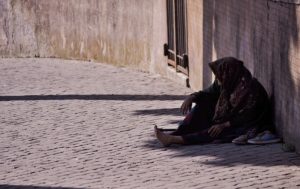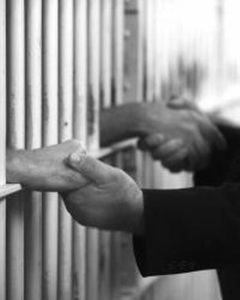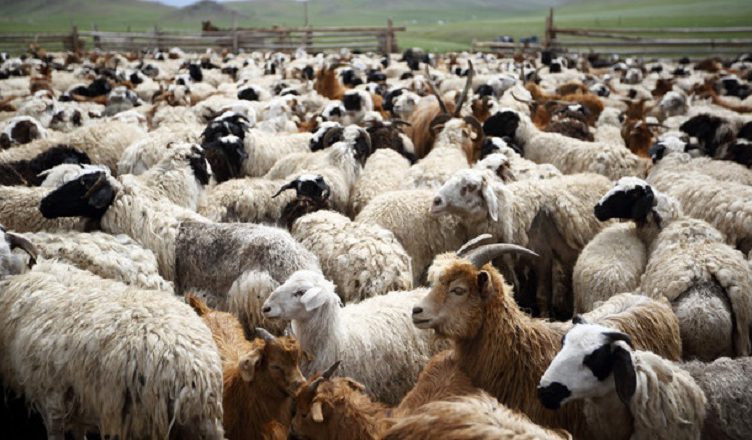From Matthew 24-25
 Jesus describes what it will be like when he returns to judge. The consequences of Jesus’ judgment are eternal. Jesus is pleased when he sees the poor and needy looked out for. He will judge and condemn those who do not care.
Jesus describes what it will be like when he returns to judge. The consequences of Jesus’ judgment are eternal. Jesus is pleased when he sees the poor and needy looked out for. He will judge and condemn those who do not care.
This post is part of my bible in a year series.
Passage and Comments
Jesus in a number of different locations speaks about the final judgment. They all have a common thread, not many of them are looked at so lets have a look now. Jesus says,
31 “When the Son of Man comes in his glory, and all the angels with him, then he will sit on his glorious throne. 32 Before him will be gathered all the nations, and he will separate people one from another as a shepherd separates the sheep from the goats. 33 And he will place the sheep on his right, but the goats on the left. (Mt 25:31–33)
This is fairly common to what Jesus says what will happen in the final judgment. There will be a separation between two different groups of people. Here its sheep and goats.
34 Then the King will say to those on his right, ‘Come, you who are blessed by my Father, inherit the kingdom prepared for you from the foundation of the world.
35 For I was hungry and you gave me food, I was thirsty and you gave me drink, I was a stranger and you welcomed me, 36 I was naked and you clothed me, I was sick and you visited me, I was in prison and you came to me.’
37 Then the righteous will answer him, saying, ‘Lord, when did we see you hungry and feed you, or thirsty and give you drink? 38 And when did we see you a stranger and welcome you, or naked and clothe you? 39 And when did we see you sick or in prison and visit you?’
40 And the King will answer them, ‘Truly, I say to you, as you did it to one of the least of these my brothers you did it to me.’
41 “Then he will say to those on his left, ‘Depart from me, you cursed, into the eternal fire prepared for the devil and his angels. 42 For I was hungry and you gave me no food, I was thirsty and you gave me no drink, 43 I was a stranger and you did not welcome me, naked and you did not clothe me, sick and in prison and you did not visit me.’
44 Then they also will answer, saying, ‘Lord, when did we see you hungry or thirsty or a stranger or naked or sick or in prison, and did not minister to you?’ 45 Then he will answer them, saying, ‘Truly, I say to you, as you did not do it to one of the least of these, you did not do it to me.’ (Mt 25:34–45)
‘I was hungry’. Jesus identifies himself with the hungry, the thirsty, the stranger, the naked, the sick and the prisoners. There is a fourfold repetition of this group of people. Clearly the parable is dominated with Jesus’ concern for the poor and needy and his identification with them.
‘When did we see you hungry?’. The righteous in the parable didn’t know they were serving Jesus when they helped the poor and needy. The wicked didn’t know they were ignoring Jesus when they neglected to help. This effectively rules out the parable is about how people knowingly respond to Jesus or the gospel. It’s about how people treat the poor and needy.
Jesus concentrates on the behaviour or lack there of with the people he judges. The righteous;
- Give food to the hungry,
- Give drink to the thirsty,
- Offer shelter to the strangers (homeless?),
- Give clothing to the naked,
- Offer help to and visit the sick, and
- Visit those in prison.
The wicked do not.
Jesus judges people according to their works in this parable. His judgment has eternal consequences.
‘My brothers’. When Jesus says ‘my brothers’ he could be referring to;
- The people who performed the service, or
- The people who received the service.
We should note, Jesus only uses this expression once. He doesn’t say to the wicked, ‘as you did not do it to one of the least of these my brothers, you did not do it to me’. This highlights that this feature is not overly important. Because Jesus only says ‘my brothers’ to the righteous it suggests Jesus is referring to those who performed the service, not those who received the service.
 Obviously ‘brothers’ conveys a strong familial connotation. Jesus in Mt 12.50 says his true brothers and sisters are those who obey the Father. In this passage, the ones who obey the Father seem to be those performing the service, they are also called the righteous.
Obviously ‘brothers’ conveys a strong familial connotation. Jesus in Mt 12.50 says his true brothers and sisters are those who obey the Father. In this passage, the ones who obey the Father seem to be those performing the service, they are also called the righteous.
 On the other hand, because Jesus so readily identifies himself with the poor and needy, such that when they were so treated, he says he was. I also see the possibility Jesus’ brothers in this passage could be his poor and needy followers.
On the other hand, because Jesus so readily identifies himself with the poor and needy, such that when they were so treated, he says he was. I also see the possibility Jesus’ brothers in this passage could be his poor and needy followers.
Western Christianity often has no idea of the lowly circumstances the early Christians endured. Poverty, alienation, and imprisonment.
46 And these will go away into eternal punishment, but the righteous into eternal life.” (Mt 25:46)
The consequences of the judgment are eternal.
About Jesus
What is Jesus trying to teach here?
First. Its clear in this parable Jesus’ judgment and eternal destinies are in view. Eternal punishment and eternal life are the only two possibilities for where the people of all the nations will spend their eternity.
Second. Its fairly clear how Jesus wants hearers of this parable to treat the poor and needy, especially those who are his followers (cf. Gal 6.10).
Do you know people who are hungry, thirsty, strange, unclothed, sick or in prison? Help them.
The overall theme of Matthew 25 is to be ready for Jesus’ return and judgment. The people hearing this parable have been given advanced knowledge of what Jesus looks for in judgment.
Jesus is pleased when he sees his poor and needy looked out for. He will judge and condemn those who do not care.
This is a recurring biblical theme. When Jesus looks around our society, he identifies himself with the poor and needy. Thus if we want to serve him, be judged righteous and receive eternal life we must especially look out for the poor and needy.
Copyright © Joshua Washington and thescripturesays, 2014. All Rights Reserved.


